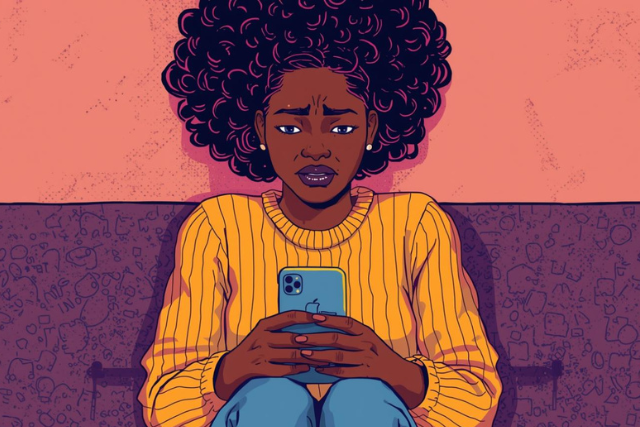Tamsen Fadal remembers the exact moment that she thought she was losing her mind: 10:30 p.m. on November 19, 2019. The longtime prime-time news anchor couldn’t remember how to pronounce the word “subpoena.”
But, as she writes in her 2025 book, How to Menopause: Take Charge of Your Health, Reclaim Your Life, and Feel Even Better Than Before, she had been experiencing word loss as well as anxiety, mood shifts, and insomnia for months prior.
She chalked it up to a few life-rattling events—a nasty divorce, an aging parent, a new relationship at midlife. And she was worried she was depressed.
X

Her doctor was dismissive of her symptoms, attributing them to stress and suggesting that she meditate. So she went to another doctor, who prescribed antidepressants. What her doctors didn’t consider and what she never even imagined was that, in her late 40s, she was entering menopause—the stage of a woman’s life when she has not had a menstrual period for a year.
Fadal is not alone in her experience. Every woman who is blessed to live to middle age and older will undergo menopause—some 1.3 million women each year in the United States alone. And while every woman won’t necessarily have the same symptoms as Fadal, most experience mood swings, anger, irritability, and anxiety due to large fluctuations in the hormones estrogen and progesterone.
Sometimes, those symptoms can be so debilitating that it affects their relationships, as well as their home and work lives. Yet how the transition to menopause can influence a woman’s Mental health is often unknown to her and isn’t always addressed—or even fully understood—by her health care providers, which can make this part of a woman’s life unnecessarily stressful.
That is slowly changing. Here’s how.
Menopause and Mental health
Women in perimenopause—the months to years leading up to menopause—which typically starts in their mid-40s, tend to suffer the most.
“Because hormonal control is dysregulated, the highs are higher and the lows are lower,” says Dr. Karen Adams, a clinical professor of obstetrics and gynecology and director of the Stanford Program in Menopause and Healthy Aging, as well as a certified menopause practitioner. “A woman will get up from day to day literally not knowing how she’s going to feel. People feel out of control and think something really scary is happening.”
Not only do many women feel out of control, but a 2024 study found that women are 40% more likely to experience depressive symptoms and be diagnosed with depression during perimenopause than women who are not yet perimenopausal.
As the study’s lead researcher Roopal Desai notes, “Our findings emphasize the importance of acknowledging that women in this life-stage are more vulnerable to experiencing depression. It also underlines the need to provide support and screening for women to help address their Mental health needs effectively.”
Other research indicates that perimenopausal women without a previous history of bipolar disorder are more than twice as likely to develop mania for the first time.
All too often, however, women are not getting the support and screening they need because many have little to no knowledge of this phase of their life, according to a new study by AARP of 4,436 women aged 18 and older. Worse, only half of the women in perimenopause, menopause, or post-menopause said they spoke to a health care provider about their issues and what help might be available—and a mere 41% actually used medical treatments such as menopausal hormone therapy (MHT) to manage their symptoms.
Another recent AARP study reveals that just 21% of menopausal women aged 45 to 64 got treatments for depressive disorders, and 20% got help for anxiety and fear-related disorders.
Part of the problem is that there’s still a lot of shame and stigma around menopause—typically couched as a period of decline and decay—and aging in general, experts say. After all, societal narratives about women who can no longer reproduce are unfortunately ageist and sexist. Midlife is when women are seen as being irrelevant, asexual, invisible, and undesirable. At the same time, there is a lot of shame and stigma around Mental health issues, as well.
Spotting the signs
While some of the tell-tale signs of menopause such as night sweats and hot flushes—known as vasomotor symptoms—are well known, many women, like Fadal, don’t recognize the Mental health symptoms of perimenopause and menopause, whether brought on by hormonal changes or from their emotional reactions to other symptoms, such as sleeplessness, weight gain, brain fog, vaginal dryness, or changes in their libido, which may make some women anxious or depressed.
Just imagine how anxiety-inducing it is to start sweating profusely or have a hot flush in the middle of a work meeting, a parent-teacher conference, or consulting with a client. It often leads women to be hyper-vigilant, self-conscious, and self-monitoring. It’s exhausting. No surprise, then, that women who have a sour attitude toward menopause overwhelmingly have more problematic menopausal symptoms.
All of which may keep women from getting the help they need.
“Mental health disorders tend to overlap with reproductive transitions in women’s lives, in part because those are times of immense physical, mental, and emotional change,” as Lucy A. Hutner, a New York City–based reproductive psychiatrist, tells Forbes.
But as Fadal discovered, doctors aren’t always well-informed about perimenopause and menopause. According to Stephanie S. Faubion, director of the Mayo Clinic’s Center for Women’s Health and medical director for The Menopause Society, a 2019 survey of family medicine, internal medicine, and OB/GYN residency trainees found that these doctors had about one or two hours of education about menopause, and some 20% said they’d had no menopause education at all.
Even if health care providers and researchers are well-informed about menopause, they still often walk a fine line when it comes to helping women navigate a natural process, says Claudio Soares, professor of psychiatry at Queen’s University School of Medicine in Ontario, Canada, and president of The Menopause Society.
“Overall, the field is struggling between, on one hand, learning more about how menopause can be challenging for some women and can be a time when they might be more vulnerable or more likely to develop depression, anxiety, or experience emotional changes; but on the other hand not pathologizing menopause,” says Soares. “This is a tricky balance. We’re talking about a period of life; we’re not talking about a disease.”
Many women describe this time in their life as “not feeling like myself,” according to a survey of more than 3,000 women organized by Women Living Better, an online evidence-based resource about menopause and its symptoms. Among the symptoms most mentioned were anxiety, nervousness, feeling easily overwhelmed and less able to cope, worrying more, panic attacks, brain fog, volatile mood, and experiencing sudden anger and rage.
“Not knowing what’s happening to your body is very anxiety-producing,” Dr. Jen Gunter, a Bay Area OB/GYN and author of The Menopause Manifesto: Own Your Health With Facts and Feminism, tells me.
Awareness helps
If women are hesitant to talk about what’s going on with their body and brain with their health care provider or if they’ve had negative experiences with health care providers, as many underrepresented and LGBTQ+ women historically have had, they’re more likely to get bad information from internet searches and “wellness” influencers instead of getting treatments that may actually help.
A 2024 article in The Lancet based on a review of numerous studies linking Mental health issues and menopause found that women who don’t have a history of depression aren’t universally or uniformly at risk of Mental health symptoms—and, indeed, just worrying about the chance of experiencing anxiety and depression may affect what they expect and experience during menopause. Other studies indicate that feeling negative about menopause actually worsens the symptoms they experience, creating a self-fulfilling prophecy.
This matters because one study of women’s attitudes toward menopause before they went through it revealed that although 18% were accepting of it, nearly 16% said they were dreading it.
The Lancet study’s lead researcher, Lydia Brown of the Melbourne School of Psychological Sciences at the University of Melbourne, Australia, and her team agree with Hutner—that the slide into menopause frequently arrives at the same time women experience other life and health stressors, adjusting to common changes in roles that often happen at midlife. This includes caregiving for elderly parents or perhaps an ill or disabled spouse, the death of a parent, going through a divorce or widowhood, or becoming an empty nester, as well as often-complicated feelings about aging and the loss of their youth that may make them more vulnerable to depression.
The researchers suggest that any depressive symptoms that develop at this time be treated as they would be at any other time in a woman’s life, such as with psychotherapy and antidepressants. They do not, however, recommend using MHT as the results of trials available don’t prove that it’s an effective treatment for depressive symptoms if a woman is not also experiencing vasomotor symptoms like hot flashes.
“Our findings support enhanced awareness of groups and individuals at risk for poor Mental health over the menopause transition and caution against automatically attributing depressed mood or other Mental health symptoms or disorders to menopause,” Brown writes. “This assumption is potentially harmful, as it creates negative expectations that reinforce stereotypes about the menopause and aging.”
In their recent article “It’s Not Just Hormones: Understanding Menopause Anxiety Through a Feminist Rhetorical Framework,” Lori Beth De Hertogh and Cathryn Molloy argue that the messaging around the anxiety brought on by perimenopause and menopause is sexist and ageist, and is particularly damaging to marginalized women, like those with disabilities or who are at or below the poverty level. They write:
While the assumption that women can easily solve menopause anxiety through diet and exercise is problematic, what’s most worrisome is this: Health care organizations almost exclusively frame anxiety as an individual’s hormonal response to menopause and rarely as something that we find to be just as, if not more, significant—anxiety as a psychological reaction to negative stereotypes about women and aging. We believe that clinically significant anxiety can also emerge in response to the acute stigma, ageism, and misogyny that are an undeniable and visceral part of this life phase.
Mindsets and menopause
But that messaging is not universal. In non-Western countries, women experience menopausal symptoms differently, according to research by Dr. Mary Jane Minkin, a clinical professor in obstetrics, gynecology, and reproductive health at Yale University School of Medicine.
“In societies where age is more revered and the older woman is the wiser and better woman, menopausal symptoms are significantly less bothersome. Where older is not better, many women equate menopause with old age, and symptoms can be much more devastating,” says Minkin.
Health care providers should ideally address the stigma associated with menopause with their patients and how such stigma can contribute to their anxiety, De Hertogh and Molloy say.
Normalizing the Mental health effects of menopause similar to the way other Mental health issues such as postpartum depression have been openly and honestly talked about would also help, says Hutner. “I would love to see a world where we discuss midlife Mental health as another stage in adult development—one that has its own distinct set of health and wellness goals.”
No one knows when or if that will occur. In the meantime, there are some non-medical treatments that have proven helpful for some perimenopausal and menopausal women experiencing Mental health challenges.
Some studies have found that just a few sessions of cognitive behavioral therapy (CBT) boosted mood, sleep, and quality of life while also reducing vasomotor symptoms. CBT also can help normalize those symptoms, as well as concerns about sexual health, while provide coping skills to better manage them.
“CBT draws on the understanding that these symptoms are intensified by stress and reactivity. When individuals are able to shift their relationship to these symptoms, the experience itself inherently changes,” says Sharon Bober, associate professor of psychiatry at Harvard Medical School and founding director of the sexual health program at its Dana-Farber Cancer Institute.
Other studies found some success with mindfulness-based interventions, although The Menopause Society says there’s not enough data to recommend it.
Yoga also appears to provide some help in sleep quality, which could offer a sense of well-being, as well as lessen anxiety and depressive symptoms, although, as with mindfulness, The Menopause Society states there’s “insufficient or poor evidence” to recommend yoga as a way to alleviate vasomotor symptoms.”
And some lifestyle changes such as quitting smoking, limiting alcohol, adding vigorous exercise several times a week, eating a nutrient-rich diet, and avoiding sugar and processed foods may also help.
Most likely, women will benefit from more than one treatment at a time.
Soares says that it’s important that women seeking help for their perimenopause or menopause symptoms share with their health care provider everything that’s going on with them as well as any history of depression, anxiety, or severe reactions to hormonal changes, whether during menstruation or pregnancy. And that they may need to be the one initiating the conversation with their health care provider and ask for referrals to other specialists if their symptoms are beyond their health care provider’s knowledge and expertise.
The transition to menopause and its Mental health impacts goes beyond “the realm of gynecology,” Faubion notes, “and we have to stop thinking of it that way.”













